Volume 3, Issue 84: Dawned on Me
"I've been young, I've been old, I've been hurt, and consoled."
Here is a button where you can subscribe to this newsletter now, if you have not previously done so. I do hope that you enjoy it.
Like many people, I’ve been rewatching old Sopranos episodes to be properly prepared for The Many Saints of Newark, which I finally saw yesterday and will be discussing on the Grierson & Leitch podcast this weekend. Revisiting the show has been revelatory in many ways—it is so much sadder than I remember it, and I remember it being pretty sad—but the primary one has how much differently I watch it in 2021 than I did in 2007. The show hasn’t changed, but I sure have.
I’ve written before how substantial a social marker The Sopranos was when it aired, but it is remarkable to look back, now, at the years it aired, from 1999-2007, and see the most formative, pivotal years of my life. I was 24 years old in 1999 and 32 in 2007, and it’s clear, when I look at my life now, that just about everything I have and don’t have now is in some way a result of decisions made and not made in those eight years. In 1999 I was a night-shift online agate editor for The Sporting News, living in a tiny apartment with a cat and eating mostly Bagel Bites; in 2007 I was running Deadspin, publishing my third book and getting yelled at on national television. Relationships began, relationships ended, friends were met, friends were lost. Life decisions made during that time reverberate still today. It’s a good thing I didn’t know how important ages 24-to-32 were when I was actually experiencing those ages or I would have been too terrified to leave my apartment.
But I was also young enough during that time that Tony Soprano, and his middle-age worries, seemed impossibly far away to me. Tony Soprano didn’t seem like a peer to me—he seemed like my dad. Well, not my Dad, specifically: My Dad can have a bit of a temper and certainly will always loom large psychologically like all dads, but he’s a terrific guy and, as far as I know, never garroted a guy while visiting college with my sister. But in the context of my life at that time, I always saw Christopher or, more so, Meadow as a contemporary rather than Tony. Tony listened to Deep Purple and the Eagles. Tony was old.
I, alas, am not 24-to-32 anymore.
There is a Sopranos episode called “Members Only,” the first episode of the sixth and final season, the one that kicks off the incredible run that closes the series, the one where a demented Uncle Junior shoots Tony at the end, that features Tony stepping on a scale. One of the countless great touches of The Sopranos was how truly awful Tony looked as the series drew to its conclusion. When the show began, Tony wasn’t skinny to any stretch of the imagination, but he was energetic and engaged: There is pep in his step and lightness in his feet. But by the end, particularly as James Gandolfini kept gaining weight, in part because of his own struggles with drugs and alcohol, Tony just looked like shit—sweaty, clammy, disheveled, just sloppy and gross, as if the rapidly corroding rot of his soul was causing his body to somehow destroy itself from within. The scale scene is the first time the show itself acknowledged it. The rest of the series would be about that erosion, of Tony’s physical self and his moral one. By the end, he was this massive grotesque soulless monster, just, as he put it, a “fat fuckin’ crook from New Jersey.”
When I watched that scene when it aired, on March 26, 2006, I was 30 years old. But when I watch that scene today, I am 45. (46 next week, actually.) That happens to be one year older than … James Gandolfini when he filmed that scene. Gandolfini’s age during “Made in America,” the final episode of The Sopranos? 45. My age.
I’m relieved to report that the scale shows something different when I step on it than what it showed when Tony Soprano did, but that’s not the point. The Sopranos is a work of art—I consider it among one of the greatest works of art of my lifetime—and my experience with it evolves and grows as I do. When I watched it when it aired, Tony and his crew were all older men, on the downsides of their lives, desperately (and pathetically) trying to hang onto whatever they could. They were also firmly established in their lives, for better and (mostly) worse: They were not starting anything, they were not on some journey of self-discovery, they were simply who they were. At their age, what more could you expect of them? They’re not going to change. They’re old.


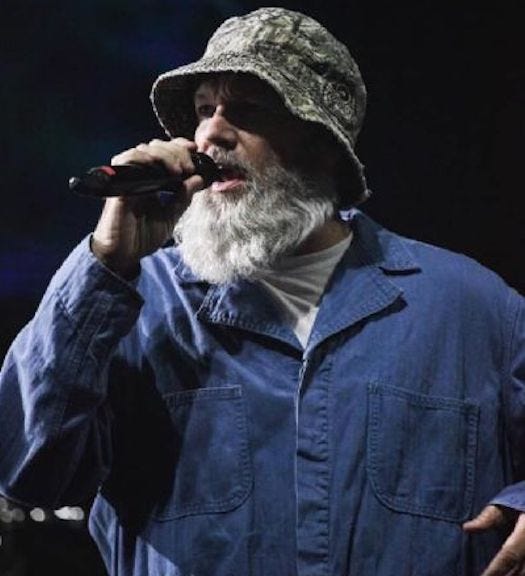
Watching the show now is jarring not because I identify more with Tony now, because I don’t. But I feel sadder for him. He walks around the world as if his life is over, as if there’s nothing left for him in his life, nowhere left for him to go. He walks around like an old man. In 2006, I thought he was right. But in 2021, I know better. Sure, I’m older than I think I am; I think everybody reaches a point where that feels true. (I’ll feel emotionally 34 when I’m 96, if I’m fortunate enough to make it that far.) But I also know that the choices I make now matter, that they make a difference, that the world is always changing and that’s it’s my job, no matter how old I am, to make sure that I change with it. The reason Tony isn’t light on his feet anymore by 2006 isn’t because he gained so much weight; it’s because he’s locked in the past, convinced the world before him was actually the idealized version he has created for himself and therefore the world after him is doomed to forever be worse. And even though we’re the same age now, I simply do not believe that. Tony Soprano at 45 lost hope. I refuse to do the same. Even if neither one of us realizes just how old we are.
It’s fun to play this game. I’m six years older than John Travolta in Pulp Fiction. I’m two years older than Humphrey Bogart in Casablanca. I’m the same age George Clooney was after two Ocean’s 11 movies. I’m nine years younger than Anthony Hopkins in The Silence of the Lambs. I’m 11 years younger than Bob Dylan when he made Time Out of Mind, an album that is in large part about being an old person looking back on all one’s life and grief and regrets. These cultural markers will keep happening, and it will always feel strange, but that’s all they are: Markers. They’re not who we are. We’ve always got time ahead of us to figure it out still. Tony Soprano was old not because he was 45. He was old because he stopped living—because he stopped trying. I will do everything I can not to make that mistake. This will not keep me young. But it will keep me from being older than I actually am.
At least this is what I’m telling myself in three years, when I’m as old as John Wayne in The Searchers and as old as Marlon Brando in The Godfather. Egads.
Here is a numerical breakdown of all the things I wrote this week, in order of what I believe to be their quality.
Kyrie Irving and the Downside of Player Empowerment, New York. The NBA is just the most fascinating league on the planet.
The Bewildering World of COVID Travel, Medium. Remember: Every single person is experiencing the pandemic differently.
Melissa McCarthy Movies, Ranked and Updated, Vulture. Updated with The Starling.
The Best Players of September 2021, MLB.com. I actually wrote a bunch of MLB.com pieces this week, but most of them are postseason previews, so you don’t get to read them until next week.
When Will Vaccine Mandates End? Medium. It has to happen at some point, yes? If just for the sake of our bartenders and waitstaff?
The Thirty: One Thing to Watch For on Every Team in the Season’s Final Weekend, MLB.com. Now the season’s final two days, obviously.
PODCASTS
Grierson & Leitch, discussing “Dear Evan Hansen,” “The Starling” and “The Guilty”
Seeing Red, Bernie and I … wow.
Waitin' Since Last Saturday, we reviewed the Vanderbilt win and previewed Arkansas.
LONG STORY YOU SHOULD READ THIS MORNING … OF THE WEEK
“Restrepo: The Defining Film About the Forever War,” Scott Tobias, The Reveal. The two top dogs from the late, great The Dissolve are back with The Reveal. As good a use of your subscription dollars as I can come up with.
BOOK I’VE READ THAT YOU SHOULD READ
“The Sopranos Sessions,” Matt Zoller Seitz and Alan Sepinwall. As mentioned above (and before), this book was invaluable in getting me ready for The Many Saints of Newark. If you don’t have 85 hours to spare for a rewatch, it’s the next best thing.
ONGOING LETTER-WRITING PROJECT!
Getting back caught up on these. Also: Finally have some more bookplates coming in There are some stragglers still because we ran out. I’m getting to you, promise!
Write me at:
Will Leitch
P.O. Box 48
Athens GA 30603
CURRENTLY LISTENING TO
“Bandages,” Hot Hot Heat. I was at the Rock and Roll Hall of Fame when I was in Cleveland last week—it’s … fine. It’s fine! Anyway, I enjoyed that they had a special section dedicated to one-hit wonders. I was thinking about one-hit wonders from the mid-aughts, essentially my grown-up formative music period, and this was the best one I could come up with. This is a pretty great song! And I couldn’t name another one from this band, or even come up with a single piece of trivia about this band whatsoever. I love one-hit wonders. The best thing about one-hit wonders is that calling them a one-hit wonder will inevitably bring out fans of the band who insist that they were so much more than a one-hit wonder. That’s great! Love the things you love!
Remember to listen to The Official Will Leitch Newsletter Spotify Playlist, featuring every song ever mentioned in this section.
I saw this display at the Rock and Roll Hall of Fame and it made me feel impossibly old.
Yeah, I’m not sure rock and roll should have a Hall of Fame.
Have a great weekend, all.
Best,
Will

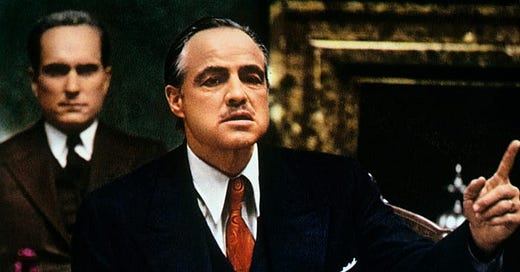



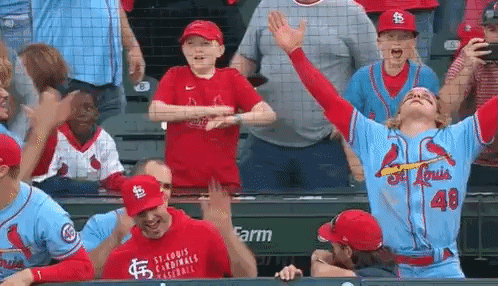

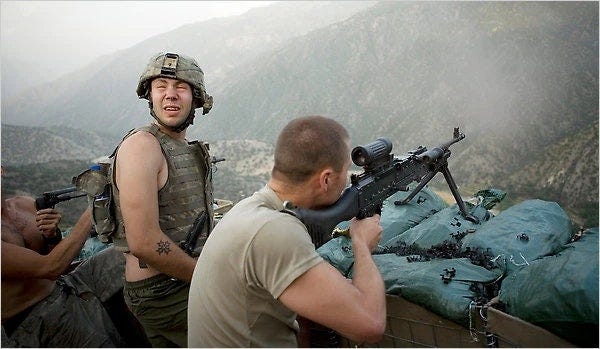

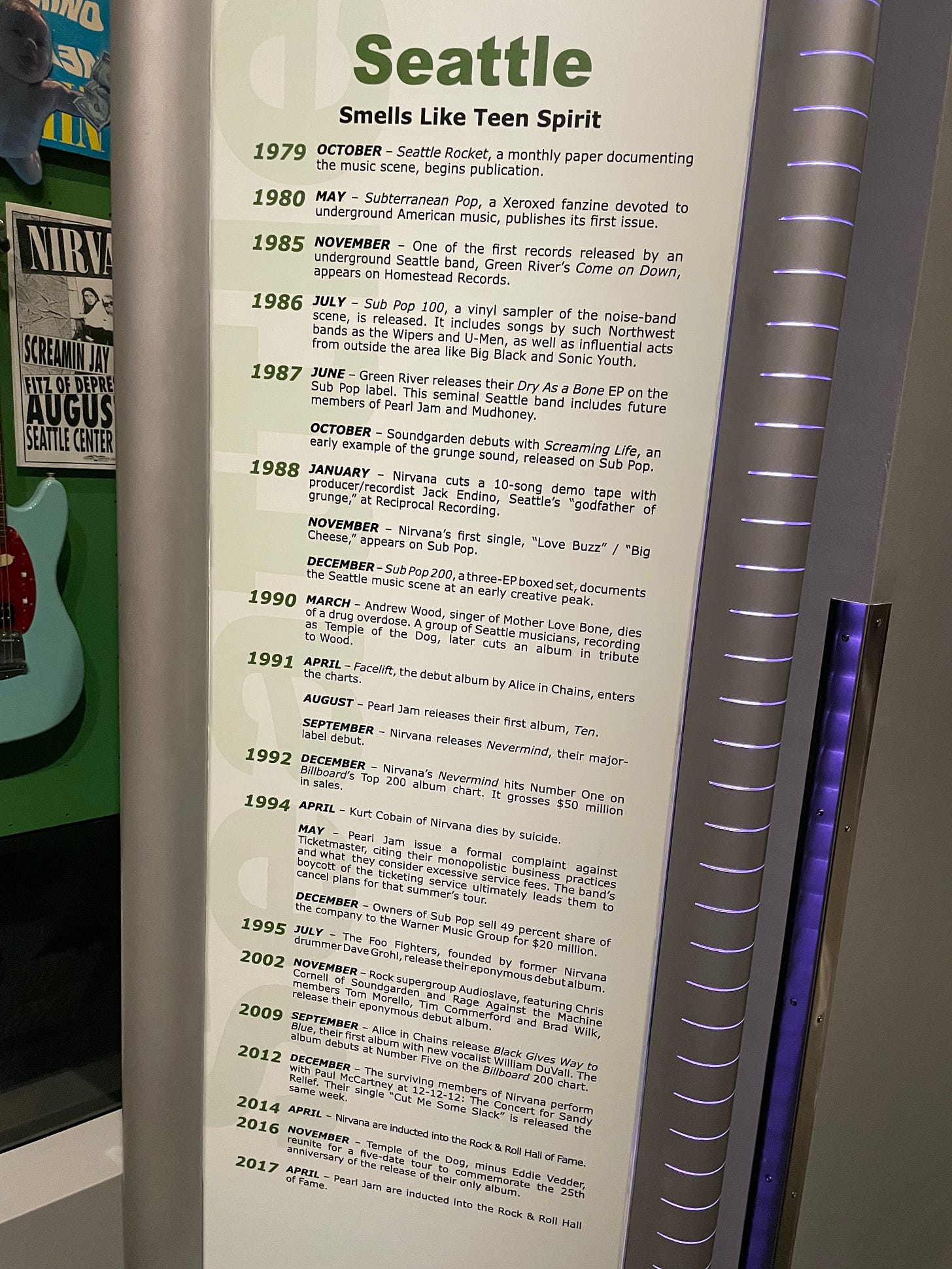
My comment has nothing to do with the above writings but an article you wrote for Country Living magazine called “A Dogged Kind of Devotion”. It touched my heart because I am a dog lover and have a faithful dog like Daisy except her name is Dolly. We, as humans, have a lot to learn from our four-footed companions!
About to start The Sopranos (again) and incredibly excited.